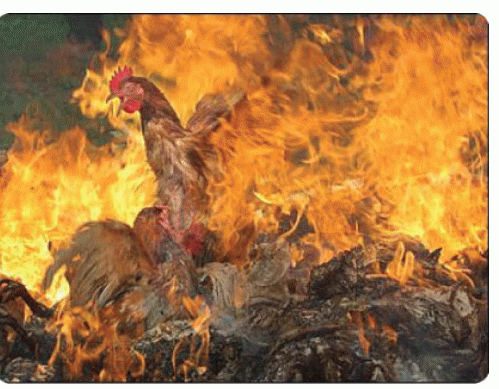FORT WAYNE, Indiana----A
predawn fire on July 28, 2014 killed 65,000 hens at an Egg Innovations barn in
Kosciusko County, Indiana, reviving attention to a two-year-old National Fire
Protection Association proposal to require sprinkler systems in farm animal
housing.
"Flames were showing. Probably shooting in the air about 20 feet," Atwood fire chief Mike Harmon told WANE-TV of Fort Wayne.

Fires caused by factory farming. When will this stop?
(Image by United Poultry Concerns) Details DMCA
The Kosciusko County barn had been acquired by Egg Innovations about a year and a half before the fire, local media reported. The dead hens were about four weeks from being introduced to egg production.
"Though Egg Innovations bills itself as a 'free range' and 'certified humane' facility, this tragedy sheds light on the deceptiveness of labeling and just one of the many dangers chickens face when exploited for their eggs on commercial farms," blogged Ari Solomon for Mercy for Animals.
Egg Innovations, descended from an egg farm founded by Herbert Brunnquell in Ozaukee County, Wisconsin, in 1917, has emerged in recent years as a national leader in cage-free egg production. The Brunnquell family focused on dairy farming for several decades, but refocused on egg production after a barn fire in the late 1960s, company president John Brunnquell told Agriview assistant editor Sara Schoenborn in December 2012.
Egg Innovations in 2000 became the first egg producer certified by the Free Farmed program formerly operated under the auspices of the American Humane Association, later replaced by the current AHA Humane Heartland program. After Free Farmed founder Adele Douglas left the AHA at the end of 2002 to found Humane Farm Animal Care, with more stringent standards than those of Humane Heartland, Egg Innovations become one of the first producers to qualify for the HFAC Certified Humane logo. Summarizes the Egg Innovations web page, "This means that the animals are fed a nutritious diet without antibiotics or hormones, and are raised with shelter, resting areas, sufficient space and the ability to engage in natural behaviors."
Egg Innovations produces Blue Sky brand free range eggs, from hens who "have never been caged, and are free to roam inside and out of their barns during favorable weather," the company advertises.
The lack of fire suppression systems in barns was spotlighted earlier in 2014 after a January 31 blaze killed 300,000 egg-laying hens at the S&R Egg Farm in La Grange, Wisconsin.
"In 2012 more than 600,000 farmed animals----mainly chickens and turkeys----died in fires in commercial housing facilities in the U.S.," said United Poultry Concerns founder Karen Davis.
"There is a reason hell is depicted as eternal fire," blogged Chicago-based health writer Martha Rosenberg. "Yet millions of farm animals die in preventable fires enabled by industrial scale farming. Recent burn victims include 7,000 turkeys at a Butterball operation in North Carolina, 250,000 chickens at an Ohio Fresh Eggs facility, and 500,000 chickens at Moark Hatcheries in Colorado."
The National Fire Protection Association in 2012 proposed an amendment to the 2013 edition of NFPA 150: Standard of Fire & Fire Life Safety in Animal Housing Facilities which would have required all newly-built farmed animal housing facilities to have both sprinklers and smoke control systems.
Founded in 1896, the National Fire Protection Association publishes and frequently updates fire safety standards used by insurance underwriters and often written into building codes.
National Fire Protection Association data shows that firefighters respond to about 830 barn fires per year in the U.S., doing $28 million worth of damage.
"The NFPA already requires sprinklers in facilities housing animals like bears and elephants who can't be easily moved," observed Rosenberg. "But 15 big ag groups including the National Chicken Council, National Turkey Federation, United Egg Producers, and cattle, pork, and dairy producers appealed against the NFPA proposal and it was scrapped. The reason? Animals' lives are not worth the cost, says big ag."
(Note: You can view every article as one long page if you sign up as an Advocate Member, or higher).




